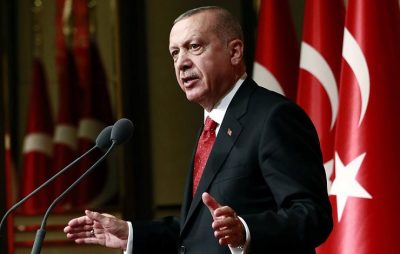Turkey’s Request for U.S. Patriot Missiles to Pressure Russia in Syria Will Not Work

Ankara’s statements about an imminent military operation in Syria and the Turkish authorities’ request for Washington to supply them with U.S.-made Patriot anti-aircraft missile systems are just Turkish President Recep Tayyip Erdoğan‘s manoeuvres to leverage against Russia that his country may be returning to the NATO camp.
With Turkey supporting and backing jihadists against the Syrian Army in Idlib, the situation in Syria is becoming increasingly hostile as Erdoğan has threatened to directly go to war at the end of the month if Syria does not reverse the gains it made in previous weeks. There is a certain danger for war that could drag Russia as it is the main backer of the Syrian Army. Turkey has not shied away that it is increasingly getting frustrated with Moscow as it has unrelentingly backed its Syrian allies against Turkish-backed forces. This becomes complicated as not only Turkey and Russia have interests in Idlib, but so do the U.S. and Iran, however, Russia and Turkey are not going to war as many have speculated.
Patriot systems will be needed by Turkey to launch a major military operation in Idlib, a province that Ankara considers to be its area of influence. Last Friday, Turkey with its jihadists allies last week attempted to invade the town of Nayrab, resulting in a complete failure that saw the death of tens of jihadists and two Turkish soldiers. This failure created a sudden realization for Turkey that its ground troops will need aviation and air defense support. Although Turkey acquired the Russian S-400 missile defense system, they will not be ready until sometime this spring, meaning that Turkey will find it difficult to contend with Syrian jets if they choose to directly go to war with the Syrian military.
It is likely that Turkey is requesting Patriots for political purposes and not to use against Russia in any potential conflict. Turkey significantly damaged their relationship with the U.S. to acquire the S-400 from Russia as Washington claimed they were not compatible with NATO military doctrine. Washington was so outraged by this purchase that it even placed sanctions against Turkey. But now Turkey’s request for the Patriots serves a political purpose in order to get closer to Washington and begin mending relations. As Erdoğan pursues foreign policy equally distant from Moscow, Washington and the EU, it is now manoeuvring and taking opportunity to apply pressure on Moscow by using a potential rapprochement with the U.S.
Although Moscow and Ankara find differences over Idlib, a complete break in Russo-Turkish relations is actually not beneficial to either state. Both countries now have vested economic interests ranging from the Turkish Stream pipeline to the construction of the Akkuyu nuclear power plant that Russia has invested heavily in. However, despite these joint projects, Moscow is also becoming increasingly frustrated with Turkey as it refused to fulfill a number of key commitments to resolve the Idlib crisis. As part of the Sochi agreement, Ankara was to separate jihadists operating in Idlib from so-called moderate forces who were willing to engage in dialogue with Damascus in the political process. Rather, this failure to do so demonstrates that the overwhelming majority of militants in Idlib belong to radical factions, particularly the Al-Qaeda affiliated Al-Nusra Front.
Erdoğan has shown he is willing to go to all expenses to defend his country’s interests in Idlib, so much so that he is willing to purchase Patriots and continue to fund terrorist organizations, all while Turkey spirals into a deeper economic crisis as the Turkish lira continues to lose value. Encouraged by NATO Secretary General Jens Stoltenberg endorsement of Turkey’s position on Idlib, Erdoğan will likely be unrelenting to achieve his goals of a neo-Ottoman Empire.
However, Erdoğan knew the U.S. would not sell Patriots to Turkey. Rather, this movie is to serve two purposes – signal to Russia that Turkey might be moving away from it, and open dialogue with Washington to normalize relations. However, both the U.S. and Russia know this is a bluff. Washington has not responded to the Patriot sale offer the way that Ankara would have hoped and Russia has relentlessly continued its bombing campaign against Turkish-backed jihadists in Idlib.
It is likely that the U.S. will only offer to sell the Patriots on a set of conditions such as ending purchases of Russian military equipment. If Turkey is to do this, it would demonstrate that Ankara is firmly back in NATO’s fold – and if it does not do this, it would show that Erdoğan was making a bluff and is all alone in the Idlib mishap. Either way, Turkey is not going to war with Russia as it has to many vested and cooperated economic interests, and by the same token will not be able to pressure Russia out of Idlib or stop its backing of the Syrian military.
*
Note to readers: please click the share buttons above or below. Forward this article to your email lists. Crosspost on your blog site, internet forums. etc.
This article was originally published on InfoBrics.
Paul Antonopoulos is a Research Fellow at the Center for Syncretic Studies.

